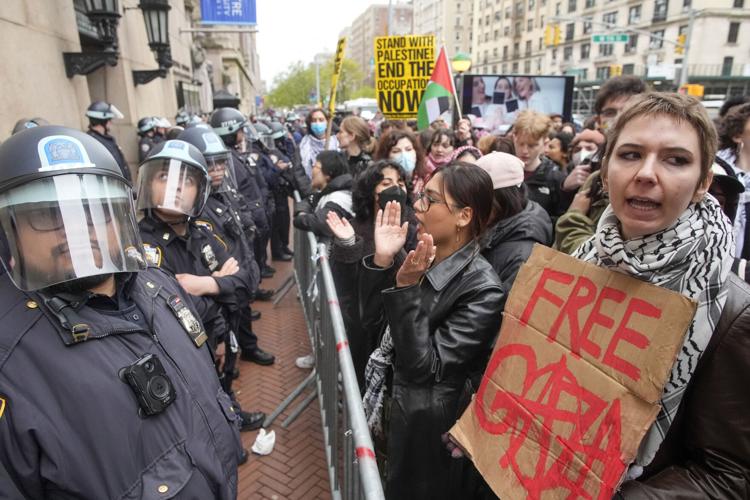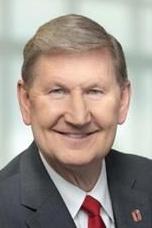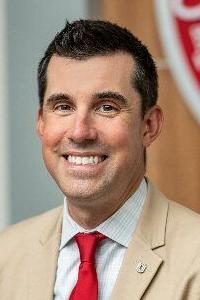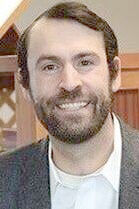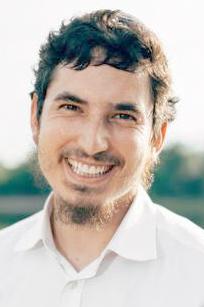From the East Coast to the West Coast, anti-Israel protests are taking place across college campuses as Jews are celebrating Passover, leading to hundreds of arrests, Jewish students fearing for their lives, schools moving classes online and universities altering plans for commencements.
The protests are calling for a cease-fire in Gaza through chants, asking the universities to divest from companies that do business with Israel and suggest the destruction of the state of Israel. The protesters demanded their universities condemn Israel’s response in Gaza after Hamas’ surprise attack on Oct. 7, 2023, which killed about 1,200 Israelis and some 250 hostages were taken, including over 100 still held captive. The Palestinian death toll from the war is at least 34,049 and 76,901 have been wounded, the Gaza Health Ministry said, according to The Associated Press. The Hamas-run health authorities do not differentiate between combatants and civilians in their death count but said at least two-thirds were children and women.
The protests have been taking place for more than a week and have not gone unnoticed by Clevelanders who have connections to some of those schools.
Columbia University in New York City and Yale University in New Haven, Conn., were among the more than a dozen schools where protests became violent.

Leavitt
“The first time I felt involved in a strong Jewish community was at Columbia,” Rabbi Noah Leavitt, a graduate of Columbia University and senior rabbi of Oheb Zedek Cedar Sinai Synagogue in Lyndhurst, told the Cleveland Jewish News on April 22. He said Columbia’s inaction toward demonstrators was “disappointing.”
The New York City Police Department was called to the campus and made over 100 arrests at Columbia after campus police took no action to break up an encampment; 48 of the arrests were students. A deadline of 8 a.m. April 24 was given to students to end the encampment, but the university administration extended the deadline for 48 hours, according to media reports.
Columbia President Minouche Shafik said at about 3 a.m. April 24, there was “constructive dialogue” and the university would continue conversations for 48 hours. The statement said student protesters “will ensure that those not affiliated with Columbia will leave. Only Columbia University students will be participating in the protest,” according to media reports.
Earlier in the week on April 21, Rabbi Elie Buechler, who co-directs the Orthodox Union’s Jewish Learning Initiative on Campus for Columbia University and Barnard College, told Jewish students to stay home until the campus environment improves.
“What we are witnessing in and around campus is tragic,” the rabbi wrote to a group of 290-plus students on the WhatsApp messaging app. “The events of the last few days, especially last night, have made it clear that Columbia University’s Public Safety and the NYPD (New York City Police Department) cannot guarantee Jewish students’ safety in the face of extreme antisemitism and anarchy. It deeply pains me to say that I strongly recommend you return home as soon as possible and remain home until the reality in and around campus has dramatically improved.”
Buechler sent the message in response to videos of protesters “calling for Jews to be killed,” CNN‘s Jake Tapper reported.

Peyson
“That this is happening doesn’t surprise me,” Rabbi Yosef Peyson, a graduate of Columbia and the youth director for Friendship Circle of Cleveland in Pepper Pike, told the CJN, “My first semester, I had a supervisor who would say things like, ‘The enemy of the Jews’ ... and then walking through the halls, and the whole thing about Israel’s apartheid. There was a whole photo gallery about that. That was my experience.”
Columbia senior Jacob Schmeltz of Montclair, N.J., told the CJN on April 22, “There was a BDS (boycott, divestment and sanctions) referendum as my lovely welcome to the university. And I also have lots of strong memories of the last war in Gaza (in) April, May 2021, of feeling very isolated from the rest of my community, and feeling that many of my peers were unwilling to speak to me about the Israeli-Palestinian conflict and unwilling to speak to me when I told them I was uncomfortable with various of their posts on social media and wanted to speak about it.”
Schmeltz, co-president of the Jewish Student Union, said the newly founded organization seeks to provide community for Jewish students at Columbia and is focused on celebrating Passover for students staying on campus for the holiday. Rhetoric used by demonstrators on campus has increased tensions, Schmeltz said, using phrases such as “globalize the intifada,” “Zionist pigs” and “Burn Tel Aviv to the ground.”
“Jewish students are scared right now,” he said. “We are frightened. I mean, even as there have been many difficult moments throughout the entire year, what has gone on in the last week has risen to another level. And it has been completely unacceptable.”
At Yale, 48 protesters were arrested, including 44 students, and a Jewish student was allegedly poked in the eye with a Palestinian flag.
“Tonight at Yale, I was assaulted by a student today at an anti-Israel protest,” Sahar Tartak, a sophomore, posted on X, formerly Twitter, after the incident. “He stabbed me in the eye with a Palestinian flag. Now I’m in the hospital. This is what happens when visibly Jewish students try to attend and document these rallies.”
Tonight at Yale, I was assaulted by a student today at an anti-Israel protest. He stabbed me in the eye with a Palestinian flag. Now I'm in the hospital. This is what happens when visibly Jewish students try to attend and document these rallies.
— Sahar Tartak🇮🇱🇺🇸 (@sahar_tartak) April 21, 2024
Tartak, who is studying history and is the editor-in-chief of the independent Yale Free Press college newspaper, said she was attempting to film the pro-Palestinian protesters when she and a friend were confronted by five activists who formed a wall and would not let them pass, according to media reports.
She said she reported the incident to campus police, who called an ambulance. At the hospital, she was discharged without suffering permanent damage. She said university police and the college administration did nothing in response, according to media reports.

Friedman
Yale is a private university and is not legally required to provide First Amendment rights, Larry Friedman, an attorney from Shaker Heights and a Yale graduate, told the CJN on April 22. However, Friedman said an institution like his alma mater should uphold freedom of speech for students as a matter of principle.
“Whether or not they’re bound by the law, the essential mission of the university, and certainly the mission of a university like Yale, is to respect the First Amendment,” Friedman said.
The line is drawn, however, when students no longer feel comfortable to attend due to the speech of others, he said.
“I don’t mind someone expressing ideas that I don’t agree with about Israel,” Friedman said. “I do mind someone making kids feel like they aren’t welcome on campus.”
Friedman said he remains active with Yale.
“I continue to interview (students seeking admission) for Yale, so I’m pretty active,’ he said. “So, I see kids that are going there today on the alumni school committee, so I think I have a good finger on the pulse.”
At The Ohio State University in Columbus, two students were arrested on April 23 and charged with criminal trespass during an on-campus protest.
The students arrested were Yousef Munir and Hana Mohamed El Nemr, according to a police report obtained by the CJN.

Johnson
Ben Johnson, assistant vice president of media and public relations for OSU, told the CJN in an email the students were issued “multiple warnings” before being arrested by university police officers at Meiling Hall, near Wexner Medical Center.
“Well established university policy prohibits disrupting the university’s mission, administrative functions and campus life activities,” Johnson said in the email. “When (Tuesday’s) demonstration became disruptive to the students, faculty and staff in Meiling Hall, the university issued multiple warnings. When the disruptive activity continued, two individuals were arrested.”
A video posted by student organizers showed about a dozen police officers and university officials blocking the entrance of Meiling Hall as student protesters occupied the building’s steps chanting “Free Palestine” and holding signs, according to The Columbus Dispatch.
“Ohio State has an unwavering commitment to freedom of speech and took this action in alignment with our space-use rules to provide for the orderly conduct of university business,” Johnson said.

Carter
The arrests follow an April 22 end-of-semester email from OSU President Ted Carter saying he respects the student body’s right to freedom of speech, but “will not compromise” on safety matters, which followed up on a post shared on X on April 20 by the official Ohio State account, @OhioState.
“Hate speech, including comments made at last week’s student demonstrations, is deplorable and does not align with our values, even if allowed under the First Amendment,” the post read. “During this difficult time, our community must treat our fellow Buckeyes with dignity and respect, and we must help keep each other safe. Making anyone feel unwelcome on our campus is unacceptable. Ohio State is first and foremost focused on the health and safety of our community. University police and trained staff are on-site for student demonstrations, including those last week. @OhioStatePres (Carter’s X account) and university leadership have been clear that when protected speech becomes incitement or threats of violence, Ohio State has and will always move quickly to enforce the law and university policy.”
Hate speech, including comments made at last week’s student demonstrations, is deplorable and does not align with our values, even if allowed under the First Amendment. During this difficult time, our community must treat our fellow Buckeyes with dignity and respect, and we must…
— Ohio State (@OhioState) April 20, 2024
In Carter’s April 22 email, he wrote college campuses “must be places where we can process these events through respectful discussion and debate.”
“We are here together to learn from one another and hear new and different perspectives – including those with which we disagree,” he wrote. “I want our students, faculty and staff to stand up for what you believe in – to have a voice and to use that voice. We must dedicate ourselves to using our voices with civility and compassion. Our motto is ‘Education for Citizenship,’ and respectful debate is at the heart of our democracy.”
At California State Polytechnic University, Humboldt, about 300 miles north of San Francisco, protesters used furniture, tents, chains and zip ties to block a building’s entrances on April 22.
Meanwhile, at the University of Minnesota in Minneapolis, Democratic U.S. Rep. Ilhan Omar attended a protest on April 23, hours after nine protesters were arrested on the campus when police took down an encampment in front of the library.
“I am incredibly moved by your courage and bravery as a student body in putting your bodies on the line to stand in solidarity to end the genocide taking place in Gaza,” Omar told those gathered, the Minneapolis Star Tribune reported.
Omar’s daughter was among the pro-Palestinian demonstrators at Columbia who were arrested on April 18, in a move that inspired protesters nationwide to start encampments, according to media reports.
Protests also have been occurring at Barnard College in New York City, Massachusetts Institute of Technology in Cambridge, Mass., Tufts University in Medford, Mass., the University of Michigan in Ann Arbor, University of North Carolina at Chapel Hill, Vanderbilt University in Nashville and Washington University in St. Louis, among other schools.
As a result, at Michigan, banners and flags will not be allowed at commencement and protests will be allowed but in designated areas away from the cap-and-gown festivities.
At the University of Southern California in Los Angeles, the university canceled the commencement speech planned by valedictorian Asna Tabassum, who has been accused of sharing and liking anti-Israel views on a social media profile, citing safety issues.
The protests have drawn the attention and condemnation of national Jewish groups and elected officials from both major political parties.
“Jewish students have the right to feel safe and welcome on their college campuses, and universities have an obligation to ensure this,” Secure Community Network National Director and CEO Michael Masters, said in a news release. “Despite this, we have witnessed an alarming rise in violent pro-terroristic rhetoric. This has created an unacceptable, hostile environment for our students, robbing them of that basic sense of safety, and gutting the idea of these institutions as places of healthy debate and dialogue. Schools must restore calm and order. The best way to do this is to enact and enforce strict anti-tent, anti-encampment policies, and have zero tolerance for assaults on either students or police. Schools must also ensure collaboration with law enforcement and students to create an environment of safety. Failure to enforce these rules will lead to escalating protests. Universities must act if they don’t want matters to get out of hand.”
Jonathan Greenblatt, CEO of the Anti-Defamation League, released a video message on April 22 with recommendations for Shafik, the university president, to restore the safety of Jewish students at Columbia.
I spent yesterday afternoon at @Columbia, walking the streets, meeting Jewish students, and observing the situation firsthand. I was shocked by what I found. 🧵 pic.twitter.com/TzlIWw6ykE
— Jonathan Greenblatt (@JGreenblattADL) April 22, 2024
“No. 1, we need NYPD back on this campus or bring in the National Guard,” Greenblatt said. “No. 2, no masks on campus.”
“This isn’t Fallujah, this is Morningside Heights,” he added, referring to the Iraqi city that was one of the strongholds of Al-Qaeda in Iraq and the Islamic State.
Greenblatt also called for students involved in disrupting campus life to be immediately suspended.
“When they say, ‘Revolution is the only answer,’ what do you think they mean?” Greenblatt asked. “We as Jews know what happens when you don’t take people at their word.”
New York Gov. Kathy Hochul condemned the antisemitic threats against Jewish students and the glorifying of the atrocities on Oct. 7, writing in an X post overnight on April 20 that “the First Amendment protects the right to protest but students also have a right to learn in an environment free from harassment or violence.”
“At Columbia or on any campus, threatening Jewish students with violence or glorifying the terror of Oct. 7 is antisemitism,” she said.
The First Amendment protects the right to protest but students also have a right to learn in an environment free from harassment or violence.
— Governor Kathy Hochul (@GovKathyHochul) April 21, 2024
At Columbia or on any campus, threatening Jewish students with violence or glorifying the terror of October 7 is antisemitism.
All 10 of New York’s Republican members of Congress called on Shafik to resign on April 21, saying in a letter that “anarchy has engulfed the campus of Columbia University.”
“The ongoing situation that has unfolded is a direct symptom of your continued lax enforcement of policy and clear double standards,” the New York GOP delegation wrote in a letter led by Rep. Elise Stefanik, R-N.Y.
Democrats also cited double standards related to Jew-hatred on campus with Rep. Jared Moskowitz, D-Fla., saying in remarks in front of Columbia’s Hillel chapter on April 21 that any other minority group would not have to encounter the level of hate that Jews are experiencing at Columbia.
“This wouldn’t be happening. It wouldn’t have gotten this far,” Moskowitz said. “But because it’s Jews, we fall into this weird category, ‘Oh, we’re not protected.’ That’s why antisemitism is on the rise.”
Moskowitz was joined by Reps. Kathy Manning, D-N.C., Dan Goldman, D-N.Y., and Josh Gottheimer, D-N.J., all of whom are Jewish. Manning was the first woman chair of the Jewish Federations of North America.
Also, on April 23, police arrested more than 200 protesters blocking traffic during a non-college demonstration demanding a permanent cease-fire in Gaza at Grand Army Plaza in Brooklyn, N.Y., near the home of Sen. Chuck Schumer, D-N.Y. The protest was organized by Jewish Voice for Peace on the second night of Passover, and protesters lay down a large circular banner depicting the food on a seder plate.
A White House spokesman commented on April 20 about the protests at Columbia University.
“While every American has the right to peaceful protest, calls for violence and physical intimidation targeting Jewish students and the Jewish community are blatantly antisemitic, unconscionable and dangerous,” said Andrew Bates, the White House deputy press secretary. “They have absolutely no place on any college campus, or anywhere in the United States of America. Echoing the rhetoric of terrorist organizations, especially in the wake of the worst massacre committed against the Jewish people since the Holocaust, is despicable. We condemn these statements in the strongest terms.”
Officials at Morehouse College in Atlanta said April 23 that Biden would appear at the iconic historically Black campus in May to deliver a commencement address that could draw protests.
The protests come amid the ADL’s reports that antisemitic incidents have reached a record-high in the United States. Incidents topped 8,800 in 2023 across the U.S., or an average of one every hour each day, according to the ADL.
JTA, JNS.org and The Associated Press contributed to this story.

